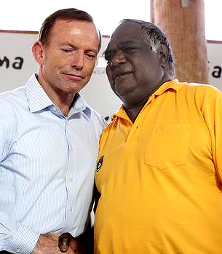Some gaps move with few improvements in annual report
 The Prime Minister has pledged to do better, and Indigenous ministers are crying out for more, with the release of this year's Closing the Gap report.
The Prime Minister has pledged to do better, and Indigenous ministers are crying out for more, with the release of this year's Closing the Gap report.
The report details the vast ongoing effort to close the gap between Indigenous and non-Indigenous Australians in areas such as life expectancy, education and unemployment.
The latest update shows a broad failure to reach the targets set for 2030, with improvement in some areas overshadowed by backward steps in others.
There has been almost no progress in closing the life expectancy gap, very little improvement in literacy and employment outcomes have actually worsened.
The failure is tempered by modest improvements to Indigenous school enrolment numbers, Year 12 achievement and the mortality rate for Indigenous children.
To account for the lack of forward progress, the Prime minister has adjusted the targets.
“We may be doomed to fail, I fear, until we achieve the most basic target of all: the expectation that every child will attend school every day,” he said.
While just 31 per cent of Indigenous students meet national literacy standards, Mr Abbot said; “it's being demonstrated in places like Aurukun that a strong education in traditional culture is actually helped by a good education in English.”
“Right around our country, it should be possible to be proudly Aboriginal and a full participant in modern Australia.
“That doesn't just mean access to a good education in cities, towns and remote settlements - it means actually going to school,” he said.
Opposition Leader Bill Shorten called for more input from Aboriginal and Indigenous communities.
“The challenge of Closing The Gap does not belong to the Parliament alone,” he said
“It belongs to the nation and the work of our generation.”
“Let us empower Aboriginal and Torres Strait Islander families, teachers, nurses, not-for-profits and business to tell us what works - rather than demanding policies that fit the rhetoric of the moment - an approach that empowers, not directives from the top-down,” Mr Shorten said.
“Aboriginal people deserve better than being told it's as simple as: 'go to school, go to work' and 'obey the law'.”
Indigenous parliamentarians say after six yearly Closing the Gap reports, there is still an incredible amount of work to be done.
“As of right now, life is not a bed of roses for Aboriginal people,” said Australia’s first female Indigenous federal parliamentarian, NT Labor Senator Nova Peris.
“Whilst the Northern Territory has made more progress towards closing the gap targets than any other jurisdiction, I fear that our gains may be lost,” she said.
“I think the issues of incarceration rates, certainly employment and long-term [school] attendance, are important measures that we have to achieve,” Australia’s first Indigenous MP, the member for Hasluck, Ken Wyatt told the ABC.
“Education is the way in which we acquire knowledge, make discernible choices and then pick opportunities and take opportunities that give us a better pathway.”
Northern Territory Health Minister Robyn Lamley says the direction is still good, but the speed of change must improve.
“I think education, getting kids to school, is an obvious area that we need to work on,” she said.
“We are closing the gap in lots of respects in health, in fact we are leading the way in lots of measures.
“We've got to keep working on this, obviously a large proportion of our population is Indigenous so the emphasis is on us to continue to provide top quality services throughout the Territory.
“It is a huge challenge,” Ms Lamely said.
As part of the renewed pledge to improve the outlook for hundreds of thousands of neglected Australians, Mr Abbot says he will fulfil his promise to spend a week running the country from a remote community in NT.
The Prime Minister says the trip will make Indigenous affairs “if only for a few days, the focus of our national Government”.







 Print
Print